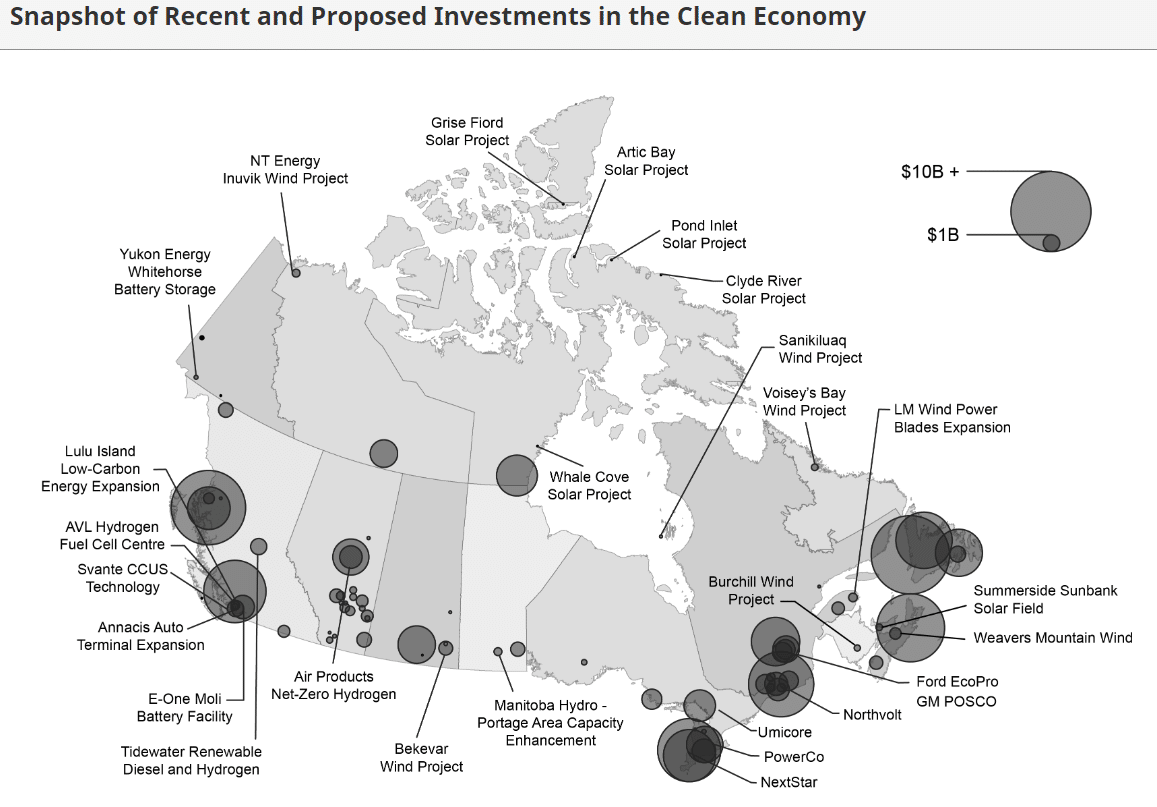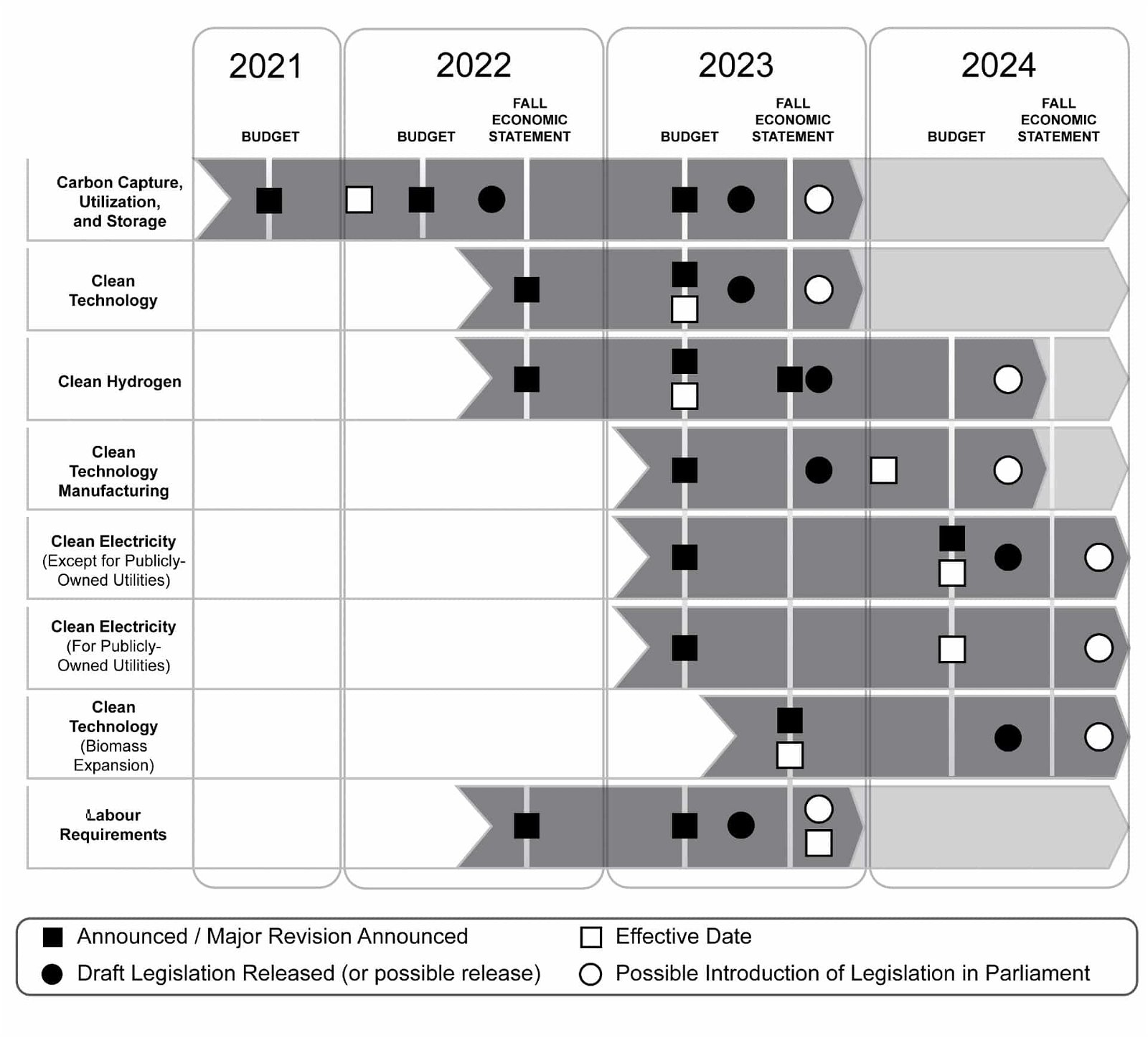About 50% of the Canada Growth Fund for clean technology investments is allocated for special contracts aimed to bolster companies’ confidence in making substantial initiatives to reduce their greenhouse gas emissions.
Finance Minister Chrystia Freeland said that nearly half of the $15-billion Fund will be for carbon contracts for difference (CCfD). She confirmed in her recent fall economic update that up to $7 billion will be allocated for CCfD.
What are Carbon Contracts for Difference?
The Canada Growth Fund employs carbon contracts for difference as a financial mechanism to support clean growth projects. These contracts encompass future carbon pricing, offering businesses predictability and mitigating risks associated with crucial emissions reduction initiatives.
CCfDs recognize that companies base their investment decisions on anticipated carbon pricing over several years to curb emissions. Such investments are deemed viable if they cost less than what the company would otherwise pay for the price of carbon in the absence of the technology.
- In essence, the contracts serve as an insurance policy of sorts against the carbon price going down or being eliminated, making the clean tech investments less risky.
For over a year, Freeland has been considering CCfDs, especially as major energy firms seek further assistance to maintain competitiveness amid substantial subsidies provided by the U.S. Inflation Reduction Act. She specifically remarked that:
“We are in a race, and we are committed to owning the podium… This is a plan to attract investment. It is a plan for the economic transformation, for the industrial transformation.”
Since Budget 2023, the federal government has engaged in consultations to develop an extensive framework for CCfD, complementing the offerings of the Canada Growth Fund.
Additionally, federal accounting bodies have been exploring the accounting treatment for broad-based carbon contracts for difference. Contracts featuring elevated strike prices may pose substantial fiscal risks for the government, requiring upfront acknowledgment of potential costs.
Despite this, experts voiced disappointment over the absence of a clear framework for the swift execution of these agreements.
But for many, the carbon contracts might serve as the last piece needed by major oilsands companies to build large-scale carbon capture and storage projects. These initiatives are vital for Canada to have any hope of achieving its emissions targets.
Canada’s Investment Tax Credits for Carbon Capture
Linked to the Canada Growth Fund updates is the investment incentives targeting clean technology and emissions reduction projects.


Update on carbon capture and storage tax credits is highly anticipated.
The Pathways Alliance, a coalition of major oilsands companies in Canada, has been pursuing these projects. But they have sought more support beyond what the new tax credit for the technology provides.
The government has provided an outline on the investment tax credits, setting a timeline for delivery and implementation.


Though the oilsands group praised the proposed carbon capture incentives, they highlighted the need to provide clear policy details.
Meanwhile, Alberta expressed concern over the extended timeline in finalizing the tax incentives for carbon capture projects. The tax credits were initially announced 2 years ago.
According to Alberta’s Energy Minister, they have lost 3 construction years due to federal delays in executing the incentive programs.
However, a non-profit executive emphasized that carbon contracts announcement has the potential to really drive low-carbon economic growth in Canada. He believes that CCfDs could launch the best industrial emissions reduction projects, making the country a destination for clean-tech investments.
Sustaining A Robust Carbon Credit Market
The Liberals’ carbon pricing policy has been a subject of constant political contention, facing persistent criticism from the Conservative party. The former’s decision to stop the carbon price increase for 3 years on home heating oil sparked debate.
The recent fall update hinted at progress on previously announced tax credits for transitioning to clean technology. This indicates the forthcoming legislation to establish tax credits for CCS and clean technology in the coming weeks.
It’s only in the summer of 2023 that the Canada Growth Fund was launched, initiating its operations aimed at deploying various financial instruments to reduce risks and enhance private investment in low-carbon projects, technologies, businesses, and supply chains. Engaging with >150 market participants, the fund has curated a portfolio of projects spanning crucial sectors within the clean economy. These include carbon capture, hydrogen, biofuels, critical minerals, and clean technology.
It reached a milestone last month, as the federal government announced its inaugural investment of $90 million in Eavor Technologies Inc., a geothermal energy company based in Calgary.
The federal government will continue to explore further avenues to offer businesses assurance regarding the trajectory of carbon pricing. Through Carbon Contracts for Difference, the Canada Growth Fund aims to bolster companies’ confidence in reducing greenhouse gas emissions. This financial mechanism can help sustain a robust carbon credit market in the country, fostering a low-carbon economy.
- SEO Powered Content & PR Distribution. Get Amplified Today.
- PlatoData.Network Vertical Generative Ai. Empower Yourself. Access Here.
- PlatoAiStream. Web3 Intelligence. Knowledge Amplified. Access Here.
- PlatoESG. Carbon, CleanTech, Energy, Environment, Solar, Waste Management. Access Here.
- PlatoHealth. Biotech and Clinical Trials Intelligence. Access Here.
- Source: https://carboncredits.com/canada-insures-carbon-price-contracts-with-7b-funding/



